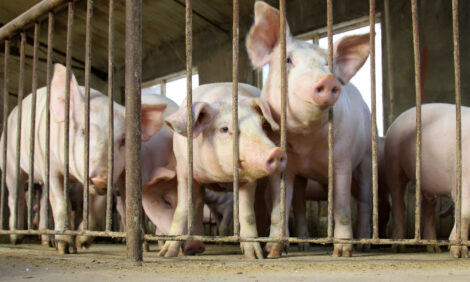



Pigs Eat Bread to Help with Human Health
DENMARK - Low-fibre and high-calorie foods are tempting but not good for our health. Eating too much may result in overweight, obesity and disease. Pigs will be used as models for humans in the development of healthy foods.
Although it is recommended to eat a healthy diet, we nevertheless sometimes find it difficult to stick to healthy foods. The typical Western diet with lots of fat, sugar and starch but low in fibre may lead to problems with overweight, obesity and type II diabetes. Scientists will now investigate if they can change the carbohydrate composition of foods to make them healthier.
One of the problems with the modern, Western diet is that it consists of refined carbohydrates. Foods such as white bread, pizza, rolls, pita bread and burger buns consist of finely ground, processed wheat flour where the carbohydrates are readily degraded and absorbed. The consequence is a rapid rise in blood glucose – and subsequently a rapidly decline again. In practice this means that you are quickly satiated, but also quickly become hungry again and hence will be tempted to eat more.
One way of preventing this is by advising the population to drop the less healthy, processed foods. Another way to get around it is to adjust content and composition of carbohydrates in foods so that they are not as rapidly absorbed by the gut – without compromising the taste experience. This is what scientists from, among others, Aarhus University are now working on.
"By adding modified carbohydrates to the food we hope to be able to reduce the rate by which glucose is absorbed from the gut and improve the regulation of the blood sugar level," says research professor and leader of the project Knud Erik Bach Knudsen from the Department of Animal Health and Bioscience at the Faculty of Agricultural Sciences, Aarhus University.
White bread with a touch of health
The project aims to investigate different types of carbohydrates in relation to type II diabetes. The scientists will study how some types of carbohydrate can affect the rate of glucose absorption from the gastrointestinal tract by feeding pigs and humans different types of fibre and starch.
One of the substances that scientists intend to test is beta-glucan. This is a carbohydrate present in the fibre matrix of, for example, oats, and previously shown to have a positive effect on cholesterol and blood sugar levels. Scientists will also be testing arabinoxylans extracted from rye and wheat. Arabinoxylans are the main fibre constituents of rye and wheat, but are partly or completely removed in the processing of flour. The scientists will also modify different types of starch to slow the absorption of glucose into the blood.
The different types of carbohydrate can, in principle, be added to many different kinds of food besides bread, for example breakfast products. The experiment will use white bread with added beta-glucan, arabinoxylans and modified starches, which will be studied in experiments with pigs, rats and humans.
"We will investigate how the absorption rate can be affected, mechanisms by which it takes place, and how diet affects the body in the short and long term. By the end of the day, we hope to be able to create new healthy food ingredients," Professor Knudsen explains.
The four-year project is carried out in collaboration with Aarhus University Hospital, the Faculty of Life Sciences at University of Copenhagen, and the three industrial enterprises Novozymes, Biovelop and Lantmännen food R&D. The project is supported by a grant from the Danish Agency for Science, Technology and Innovation and Nordforsk.






